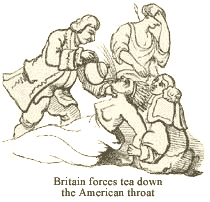The East India Company, famed for spreading English influence throughout India, had fallen on hard times in the early 1770s. Its market for Indian teas in the American colonies was a casualty of the taxation tiff that was growing increasingly ugly. In 1767, British policymakers had imposed a duty on tea and other commodities destined for the colonies. A boycott of British goods convinced the government that it should repeal the unpopular Townshend Duties in 1770, but insisted on retaining the tax on tea as a matter of principle. Not surprisingly, the Americans continued to boycott tea. As a result, the East India Company had warehouses full of tea, but was teetering on the brink of bankruptcy. The British government responded in 1773 with a program designed to answer two needs: (1) extend assistance to the East India Company, and (2) challenge the American colonists on the nettlesome taxation issue. The Tea Act of 1773 provided for the following:
 The optimists in Britain were disappointed by the American reaction. Ordinarily conservative shippers and shopkeepers were directly impacted by the new law and were vocal in their opposition. Previously, American ships brought much of the tea from England, but that trade was now reserved for the East India Company. The shop owners objected to the new practice of using only selected merchants to sell the tea; many would be excluded from this trade in favor of a new monopoly.
Opposition developed to the arriving tea shipments in Boston and other colonial ports. The Tea Act actually revived the flagging careers of agitators like Samuel Adams, who had been frustrated in recent years by the relative calm in the relationship with the mother country. The radicals found allies in the formerly conservative business community.
Public anger was sufficient to induce many of the appointed tea agents to resign their positions before the tea arrived. In New York City and Philadelphia the ships’ masters quickly assessed the situation on arrival and headed back to England. In Annapolis the ship owner was forced by angry demonstrators to set fire to his ship and its cargo of tea.
The focal point of opposition, however, was Boston. There Governor Thomas Hutchinson, whose relatives were the local tea agents, decided to force the issue. The outcome was the Boston Tea Party.
The optimists in Britain were disappointed by the American reaction. Ordinarily conservative shippers and shopkeepers were directly impacted by the new law and were vocal in their opposition. Previously, American ships brought much of the tea from England, but that trade was now reserved for the East India Company. The shop owners objected to the new practice of using only selected merchants to sell the tea; many would be excluded from this trade in favor of a new monopoly.
Opposition developed to the arriving tea shipments in Boston and other colonial ports. The Tea Act actually revived the flagging careers of agitators like Samuel Adams, who had been frustrated in recent years by the relative calm in the relationship with the mother country. The radicals found allies in the formerly conservative business community.
Public anger was sufficient to induce many of the appointed tea agents to resign their positions before the tea arrived. In New York City and Philadelphia the ships’ masters quickly assessed the situation on arrival and headed back to England. In Annapolis the ship owner was forced by angry demonstrators to set fire to his ship and its cargo of tea.
The focal point of opposition, however, was Boston. There Governor Thomas Hutchinson, whose relatives were the local tea agents, decided to force the issue. The outcome was the Boston Tea Party.